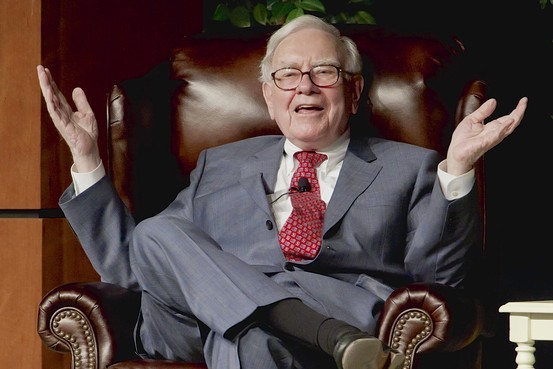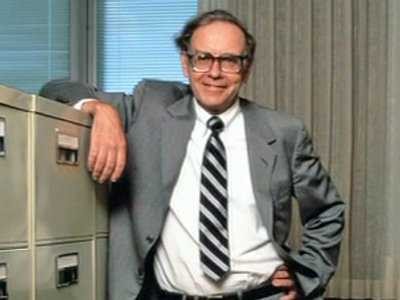The Berkshire Bookshelf Light Reading for Buffett Converts MoneyBeat
Post on: 16 Март, 2015 No Comment

Warren Buffett
Charlie Munger and Warren Buffett. Associated Press
It’s going to be a big weekend for fans of Warren Buffett. The billionaire investor is putting out an even-longer-than-usual annual letter to Berkshire Hathaway Inc. shareholders as the company celebrates 50 years under his control.
There’s a chance the extra attention on the Oracle of Omaha will pique the interest of some new investors too.
If the release of Mr. Buffett’s annual letter prompts you to go hunting for more information about the famous Berkshire chairman and his investing history, we’ve got you covered.
What follows are some of the key writings that new Buffett converts often stumble over as they try to learn about Mr. Buffett and school themselves in his value-investing ethos.
Berkshire’s past annual letters. To learn about Mr. Buffett, start with the writings that come straight from the Oracle himself. Mr. Buffett starts working on each letter months in advance, goes through multiple drafts and weighs each word carefully. Taken together, they tell the history of Berkshire, reveal his investing philosophy and offer a peek into how his mind words. As he told a class of business school students in 2013, he tries to include a “teaching lesson” in each one that has nothing to do with his company.
Letters since 1977 are available on Berkshire’s website. Mr. Buffett keeps a copy of this book on his desk that has all the letters dating back to 1965.
Buffett Partnership letters. Before he took control of Berkshire, Mr. Buffett was already a successful stock-picker who was making money in the market on behalf of a small group of investors—many of them his friends and neighbors from his hometown of Omaha, Neb. For a glimpse at Mr. Buffett’s pre-Berkshire thinking, Buffett devotees like to pore over those early partnership letters.
An earlier generation of value investors passed around photocopies of the letters like they were lost scriptures. Nowadays, they’re available online in several places, such as here and here .
The Intelligent Investor. by Benjamin Graham. Of this classic tome on value investing, Mr. Buffett once wrote. “Picking up that book was one of the luckiest moments in my life.” After reading it, Mr. Buffett enrolled in Columbia University so he could take classes from Mr. Graham, and later went on to work for him. Even now, when asked a question about his approach to investing, Mr. Buffett is liable to cite specific chapters from the book.
(On a related note: Irving Kahn, an investor who helped Mr. Graham craft the book, died Tuesday at the age of 109.)
Buffett: The Making of an American Capitalist. by Roger Lowenstein. As our colleague Jason Zweig wrote last year, when he compiled an investing reading list with a wider scope than this one, “this book remains the most comprehensive and illuminating study of Warren Buffett’s investing and analytical methods, covering his career in remarkable detail up until the mid-1990s.” Nearly every serious follower of the Graham-Dodd-Buffett school of investing has read it.
The Snowball: Warren Buffett and the Business of Life. by Alice Schroeder. This is the authorized biography of Mr. Buffett, and Ms. Schroder had unparalleled access to the Berkshire chairman for years as she worked on the manuscript. Some Buffett devotees complain that details about Mr. Buffett’s personal life crowd out information about his investing decisions, but readers who finish the massive book will come away with a full portrait of what makes the Oracle of Omaha tick—and the effect his razor-sharp focus on investing had on those around him.
The Warren Buffett CEO: Secrets from the Berkshire Hathaway Managers. by Robert Miles. Mr. Buffett’s success as a stock-picker is widely celebrated, but Berkshire now consists of roughly 80 wholly owned companies too. The businesses that Berkshire owns outright are run by a group of people that receive relatively little attention. Mr. Miles scored interviews with several (including a few who have since departed the firm), and walked away with an interesting take on the Berkshire story from their perspective.

Poor Charlies Almanack: The Wit and Wisdom of Charles T. Munger. edited by Peter Kaufman. Alongside Mr. Buffett for the whole ride at Berkshire has been his vice chairman, Charlie Munger. Mr. Buffett hasn’t been shy about attributing much of Berkshire’s success to his right-hand manin no small part for saying no to stupid ideas.
More In 50 Years at Berkshire
Where Mr. Buffett can be folksy in his public demeanor, Mr. Munger can occasionally be scathing. But he’s also a deep thinker on human behavior—and human frailties—and has spoken often about how investors can shoot themselves in the foot. This book collects Mr. Mungers speeches and other writings in an informal anthology.
In his own recent book, The Education of a Value Investor, fund manager Guy Spier wrote that he drove around for months listening to nothing but a single Munger lecture on human misjudgment. It’s included in this book alongside several other speeches.
Secrets in Plain Sight: Business & Investing Secrets of Warren Buffett. by Jeff Matthews. True Buffett acolytes head to Omaha each year for Berkshire’s annual meeting, where Mr. Buffett and Mr. Munger hold court for hours. This book is probably among the more accessible ways to get started learning about Berkshire, as it recounts the author’s trips to the meeting and use them as a platform to talk about Berkshire and its leaders. Mr. Matthews covers Mr. Buffett’s answers to many of the substantive questions asked at the meetings, so reading the book is like sitting next to a smart friend who’s providing commentary.
Berkshire Beyond Buffett: The Enduring Value of Values , by Lawrence Cunningham. In this book, the most recently published among those on this list, Mr. Cunningham addresses a question perennially on Berkshire shareholders’ minds: Will the company Warren Buffett built survive without him? It’s an especially timely question now, as it’s the topic Mr. Buffett is expected to discuss in detail Saturday in his latest annual letter.
Like the book by Mr. Miles, he speaks to Berkshire leaders far from Omaha to help paint a fuller picture of the massive conglomerate. Mr. Cunningham concludes that Berkshire will survive beyond Buffett because it has “distinct features and a strong corporate culture” across its many operating subsidiaries.
What did we miss? Feel free to suggest further reading in the comments—though it’s best to list titles, not links. Most attempts to paste a URL will be blocked by our spam filters.














